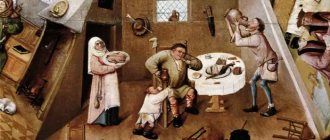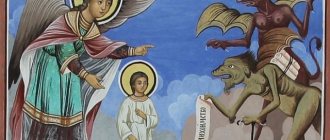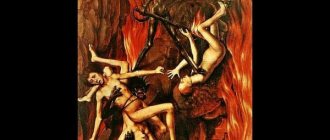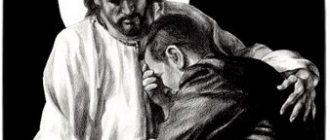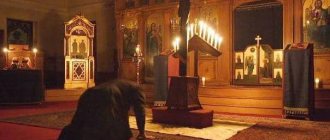3. Feelings alone without words are not repentance.
Feelings and words help each other in confession, although the first does not replace the second. As the Good and Gentle Master Himself, these Thy servants to resolve themselves with a word , says one of the prayers before confession. We are absolved from sins with words, not with tears and feelings.
Crying over sins is commanded to us by the Lord. Blessed are those who mourn, for they will be comforted (Matt. 5:4). But they will be consoled not because tears alone are enough for repentance. True mourning for sins will certainly teach you how to resolve yourself with words. But if we cry and cannot really say anything about our sins, this is not confession. Then you need to return home, think it over well and come again, firmly remembering your sins or writing them down.
It happens that we cry more because we feel very sorry for ourselves. This crying does not lead to bliss; on the contrary, it only prevents us from repenting. The stronger our love for God, the stronger the desire to part with sins. On the contrary, the more we love ourselves, the less we care about repentance, and its place is easily taken by sadness about our own experiences. In this case, it is important not to give yourself the freedom to pour out your feelings instead of sins. If we are so carried away by them that we almost don’t remember the sins themselves, then first we will take the trouble to remember the sins, and only after that we will go to confession.
4.You can remember sins even with poor memory.
It is not uncommon to hear serious confessions from those whose memory is rather mediocre. Others, on the contrary, do not remember their sins and have a much better memory. They remember their whole life, but they do not remember their sins. From them we hear: “I have sinned in deed, word and thought, I don’t know what else can be said...” But only those who truly repented at confession can receive communion. “In deed, word and thought” is not repentance for specific sins. The priest is forced to explain to these people that they do not receive communion with such confession. What's next? Others leave offended, saying that they have no sins, but there are very few of them. Most often, we immediately hear... a normal confession. What happened? Has your memory suddenly improved? No, there was a desire. They wanted to - and immediately remembered many sins. After all, we remember everything that makes an impression on us for a long time and clearly, and if we forget our sins, doesn’t this mean that we simply do not attach serious importance to them?
5.The fewer gross sins, the deeper the confession becomes.
If the most serious sins have already been confessed and have not been repeated, this is only one step of repentance. The total weight of the so-called “minor” sins is many times greater than that of mortal sins. The fact that we do not commit sins that others allow themselves does not change the essence of the matter: everyone will answer for themselves. To whom more is given, more will be required; whoever does more sees better what he did not do or did wrong.
6.The best preparation is to remember a little each day.
“Who forbids you yourself,” says Father John (Krestyankin), “to think carefully in advance about your life, preparing for Confession during several days of fasting, so that you have something to repent of... At home, before the Face of the Lord, you need to think through your life and namely, their private violations of the will of God. Check yourself: does all my behavior correspond to what the Lord requires of me as a Christian. If you accustom yourself to such testing, then such an abyss of sins will be revealed to you in your soul...” (Archimandrite John (Krestyankin). Experience in constructing a confession. M., 1999. pp. 30–33.)
Is it possible to do all this within two or three hours or even a day or two before confession? Perhaps, but only if we have already trained ourselves to examine our conscience every day. If not, no amount of effort expended before confession itself will help us remember everything that we have forgotten.
Each of us, if desired, can remember or write down the sins he has committed during the day - be it in deed, word or thought. It’s good if we write down several of them, or at least one. The point, of course, is not to write down exactly thirty sins for confession in a month. Our task is broader and deeper - to remember everything we have sinned against. And if in a month or more we can remember only one or two sins, this means that we are not yet ready for confession.
7.Irregular confession cannot be complete.
The most meaningful confession usually occurs among those who begin this Sacrament on average at least once a month. The longer we go without confessing, the worse we remember our sins. Of course, you can repent wholeheartedly even after long breaks, and for many the very first confession is quite meaningful. But it’s unlikely that anyone will be able to maintain this good mood if a lot of time passes before the next confession.
8.First, what is the hardest thing to talk about.
If you hide anything from me, it’s a complete sin,” says the following of the Sacrament of Confession. “Sugub” means “doubly”; a hidden sin becomes even heavier after confession. Someone will ask - how detailed should confession be? So much so that the priest understands the essence of the matter.
In a word, if we knew how to sin and want not to be condemned for it, we must name our sins in confession as specifically as they would be named to us at the Judgment. As one experienced confessor said, the one who is glorified by God is the one who completely disgraced himself before the priest during confession.
9.We repent to God of sins, not of types of sin.
We offend God with our sins, not with what they are called. The names of sins and passions (“I sinned by condemnation, negligence, lies”) are the most primitive confession; as short and convenient as it is, it is also far from reality. By calling sins only by name, we cannot say what we repent of. “Condemnation, negligence, lies” - the words are too general and unclear.
We ask God for forgiveness in confession for our actions, words and bad thoughts. It is for them that He forgives us, but only when we confess them. “I forgive and absolve you from all your sins,” says the prayer of permission. From all the sins we confessed, if, of course, they were told.
10.The fewer unnecessary words the better.
And for those who are waiting their turn behind you, and for the priest, and, of course, for you. We are talking about all those words that do not help the priest to better understand what exactly you are repenting of. You hear a lot of them, and the one who repents of them is the first to get lost.
A long speech is not always meaningful. When confession is drawn out, this does not mean that we repent better. Rather, we are simply less prepared or too in love with ourselves. The abundance of pauses and retreats bears the stamp of selfishness, as well as sloppy thinking. Often long stories, if told more quickly, could be several times shorter without any damage to the content.
If you find it necessary to write your confession and have the priest read it himself, please remember that you are writing a confession and not anything else. No need to write an autobiography. There is no need to pour out your feelings under the guise of confession - these are different things. If your thoughts are not yet in order, sort them out and then write. Do not write prayers of your own composition mixed with sins. Don’t write about what you should have done - write only your sins.
11. Discussions about sins are also unnecessary.
“This means that such and such a passion operates in me”; “which means that both things contribute to it,” “which means that it has only intensified in me,” “which means that I have such and such a sin...” This is also an extreme. This happens when we have thought everything over, but at the same time we do not repent, but philosophize. Meanwhile, asking for forgiveness and reasoning are far from the same thing. If someone offends us and says: “Forgive me, I’m to blame,” that’s one thing. And it’s completely different if we hear: “I’m sorry,” it was such and such a passion that acted in me, and it acted for such and such reasons.” It is inappropriate, and most importantly, in reasoning of this kind passion really operates: pride. By reasoning instead of repenting, we place ourselves somewhat higher than a person who asks for forgiveness of sins should place himself. And the one who comes to confession trusting in the mercy of God and realizing that he himself is nothing, will repent without reasoning and without any “and therefore.”
12.Don't justify yourself in anything.
Self-justification is the first enemy of confession. It is worse than the fear that the priest will think badly of you. There is more guile in it than in hiding sins out of shame. We will not hide sins that we are well aware of for long. Someday a sensible thought will appear: after all, if we are talking about life and death, what difference does it make what we look like? He will appear and lead us to confession along with previously hidden sins.
13. Without real effort, everything will be ineffective.
So far we have talked about confession itself. And yet, an honest, collected and detailed confession is only part of repentance. The other part is the desire to fix the matter itself. If things are no longer correctable, in any case the internal structure that led to them must be overcome. It cannot be corrected without confession, but it cannot be corrected by confession alone: repentance - a change - be it of the mind, soul or heart, must also affect a person's affairs - it must become a change in life.
There are no states of mind when it is impossible to repent. True, it happens that we do not want to repent, but we do not want and we cannot - two different phenomena. Disbelief in God is always voluntary, as is reluctance to turn to Him. We weren't taught? But is it only this? Or was everything that we know, know and love specially grafted from the outside by someone? Reluctance to remember and see sins, reluctance to live in accordance with the Truth - all this, of course, prevents us from repenting. Only here the point is not in impossibility, but in our deep, strong and tender narcissism - and it is voluntary.
There is no sin that will not be forgiven if we repent of it. The key to the Kingdom of Heaven is in our hands: will we be able, or rather, will we want to use it? May the merciful Lord vouchsafe us to bring Him sincere and unfeigned repentance.
References:
What is the doctrine of ordeals based on and what are they?
The doctrine of ordeals is based on Holy Scripture and the Holy Tradition of the Church. Divine Revelation repeatedly testifies to the desire of demons to rule over man. For example, the devil is reported to “prowl about like a roaring lion, seeking someone to devour” (1 Peter 5:8). It goes without saying that the desire of the devil to devour his victim is not limited to his earthly life, but extends to the afterlife. It is in this context that the biblical image of hell in the guise of a living creature with an immensely gaping predatory mouth (Is. 5:14), an insatiable womb (Sir. 51: 7) becomes understandable. After all, it descends into a person only through the soul, that is, after the separation of the soul from the body. Actually, the opportunity to seize and imprison a human soul in hell opens up to demons only during this period.
Satan is called in Scripture the prince of the power of the air (Eph. 2:2). Air is that above-ground sphere of space through which the souls of the deceased ascend to Heaven (Acts 1:9). It is here that the theater of the struggle of demonic forces unfolds for the possession of the soul, which the devil, in collaboration with the fallen spirits subordinate to him, “lies in wait in a hidden place, like a lion in a den; lies in wait to capture the poor; he seizes the poor, dragging him into his nets” (Ps. 9:30).
But here's an opportunity! The devil is not able to simply take and captivate a human soul, taking it away from the Lord of lords (Job.2:6). After all, although he is strong, he is not omnipotent, like God. Therefore, he strives to achieve dominance over the soul, wanting to show it unworthy and, most importantly, incapable of living in the Kingdom of Saints.
Since the devil is a slanderer and the father of lies, and also a “murderer” (John 8:44), it is clear that if not for the intervention of God, not for the guardianship of angels, he, under the guise of fair exposure, would slander anyone. After all, “When he speaks a lie, he speaks his own way” (John 8:44).
Hence the need for Divine help, hence the prayer: “Lord, my God! I trust in You... let him not, like a lion, tear out my soul, tormenting me when there is no deliverer [and saver]” (Ps. 7:2).
The task of justifying the soul, remembering its good deeds (thoughts, desires, etc.), is entrusted by God to the angels, since “they are ministering spirits sent to serve for those who are to inherit salvation?” (Heb. 1:14).
A classic example of angelic care of the soul is the parable of the rich man and Lazarus: “The beggar died and was carried by the angels into Abraham’s bosom” (Luke 16:22). We find an example of the taking of a soul by evil demons in the story of a crazy rich man: “God said to him: crazy! This very night your soul will be taken from you” (Luke 12:20).
Differing among themselves in hierarchical degrees, malice, and deceit, demons, at the same time, differ in the areas of activity associated with the destruction of souls. In this regard, certain types of sins are exacted from souls not by any kind, but by certain demons, mytniks. All this happens in stages, sequentially: first in one place the soul is asked for some types of sins, then in another for others, and so on until the end of the tests (sometimes there are twenty or more types of such places). At the same time, the soul is tormented, suffers suffering and excruciating horror.
The places where the soul ascending to Heaven is tested, by analogy with those places where taxes and duties are collected from people, are called “ordeals” (from the word “publican” - tax collector). Such a parallel is appropriate not because any tax collector is a priori likened to demons and vice versa, but due to the fact that in ancient times publicans often committed cruelty, injustice and extortion.
A short list of sins tortured at ordeals
God's Last Judgment
The essence of the doctrine of ordeals is expounded by St. Cyril of Alexandria in the word “On the Exodus of the Soul.”
Ordeal is the inevitable path by which all human souls, both evil and good, make their transition from temporary earthly life to an eternal lot.
During the ordeals, the soul, in the presence of angels and demons, but also before the Eye of the All-Seeing God, is gradually and thoroughly tested in all deeds, words and thoughts.
Good souls, justified in all ordeals, are ascended by angels to the heavenly abodes for the beginning of eternal bliss, and sinful souls, detained at one or another ordeal, by the verdict of an invisible court, are drawn by demons to their dark abodes for the beginning of eternal torment.
Thus, ordeals are a private judgment that is carried out invisibly by the Lord himself through his angels over each human soul, including the evil tax collectors who accuse demons. In the life of Rev. Vasily the New (Ch.M. March 26) it is narrated that his student, the reverend. Gregory (also March 26), were revealed in detail in a vision both the circumstances of the hour of death and the walk through the ordeals of Blessed Theodora.
See the Word on Confession.
Below is a short list of sins tortured at all 20 ordeals, as an auxiliary tool for more thorough preparation for the Sacrament of Repentance (Confession). Questions in the ordeals begin with sins, as we call them, “small”, universal ones (idle talk) and what goes further , thus they relate to more important sins and end in the 20th ordeal with unmercifulness and harshness towards one’s neighbor - the most serious sins, for which, according to the word of God, there is “judgment without mercy” for those who have not shown mercy.
1. WORD : unspeaking, verbosity, idle talk, idle talk, idle talk, slander, foul language, anecdotes, obscenity, vulgarity, distortion of words, simplification, grandiosity, absurdities, ridicule, laughter, laughter, name-calling, singing passionate songs, rumors, grumpiness, tongue-tiedness , vileness, incitement, blasphemy, desecration of people and the name of God, taking things in vain, rudeness.
2. LIE: flattery, sycophancy, pleasing with cunning, meanness, cowardice, antics, vanity, isolation, imagination, artistry, perjury, perjury, concealing sins in confession, secrecy, breaking the promise given in confession not to repeat sins, deceit.
3. Slander: insults, condemnation, distortion of the truth, sneaking, complaints, abuse, mockery, promoting the sins of others, impudence, cynicism, moral pressure, threats, mistrust, doubts.
4. Gluttony: gluttony, binge drinking, smoking, secret eating, breaking fasts, feasting, drunkenness, drug addiction, substance abuse, etc., gluttony.
5. LAZINESS : negligence, inattention, oblivion, oversleeping, idleness, despondency, carelessness, cowardice, weakness of will, idleness, forgetfulness, carelessness, hack work, parasitism, unnecessaryness, coldness and lukewarmness towards the spiritual, carelessness about prayer, carelessness about salvation, insensibility.
6. THEFT: theft, theft, sharing, adventures, scams, complicity, use of stolen goods, fraud, misappropriation in the form of seizure, sacrilege.
7.LOVE OF AVERAGE: self-interest, search for profit, over-concern, acquisitiveness, greed, stinginess, hoarding, lent money at interest, speculation, bribes.
8. EXCEPTION: extortion, robbery, robbery, deceit, tricks, failure to repay debts, scams, fraud.
9. FALSE: deception, falsehood, bribery, unjust trial, dishonor, extravagance, suspicion, concealment, complicity.
10. ENVY: in material goods, in spiritual merits, partiality, desire for someone else's.
11. PRIDE: conceit, self-will, self-aggrandizement, exaltation, vanity, arrogance, hypocrisy, self-adoration, disobedience, non-compliance, disobedience, contempt, shamelessness, dishonesty, blasphemy, ignorance, insolence, self-justification, stubbornness, unrepentance, arrogance.
12.MEMORY : rancor, gloating, revenge, vindictiveness, sabotage, bullying, tricks, slander.
13. ANGER: intransigence, hot temper, hatred, rage, blows, kicks, insolence, embitterment, despair, quarrels, squabbles, hysterics, scandal, treachery, mercilessness, rudeness, resentment.
14. MURDER: (in thought, word, deed), fights, use of all kinds of instruments or drugs for murder, abortion (or complicity).
15. MAGIC: fortune telling, sorcery, astrology, horoscopes, fashion seduction, healing (extrasensory perception) hiding behind the name of God, levitation, witchcraft, witchcraft, sorcery, shamanism, sorcery.
16. FORMARRY: carnal cohabitation outside of church marriage, voluptuous views, lustful thoughts, dreams, fantasies, raptures, pleasures, permission to sin, desecration of chastity, nightly desecrations, pornography, watching depraved films and programs, masturbation.
17. ADULTERY: adultery and also seduction, violence, fall, violation of the vow of celibacy.
18. FORMINATION OF SODOMA: perversion of nature, self-satisfaction, self-torture, violence, kidnapping, incest, corruption of minors (direct and indirect).
19. HERESIES: unbelief, superstition, distortions and distortions of the truth, distortions of Orthodoxy, doubts, apostasy, violation of church decrees, participation in heretical gatherings: Jehovah's Witnesses, Scientology, the Mother of God Center, Ivan, Roerich, as well as in other atheistic associations and structures.
20. UNCHARITY : insensibility, ruthlessness, persecution of the weak, cruelty, petrification, callousness, did not care about children, the elderly, the sick, did not give alms, did not sacrifice themselves and their time for the sake of others, inhumanity, heartlessness.
See the Word on Confession See The Eight Main Passions and Virtues (St. Ignatius Brianchaninov) See How to Prepare for Holy Communion
What is the difference between approaches to the interpretation of ordeals?
The tradition of the Church knows many experiences of going through ordeals. In principle, their explanation comes down to two judgments that do not contradict each other. According to some, going through ordeals is a testing stage that precedes the Divine decision - the Private Judgment; and according to others, this Judgment begins with the ordeal.
Thus, according to the testimony of St. Macarius of Alexandria, God’s Judgment on the soul takes place on the fortieth day after leaving the body. Before this, the soul is elevated to worship God twice more - on the third and ninth days. Moreover, for the first two days she remains on earth; from the third to the ninth he flies around the spaces of the Heavenly Paradise, and from the ninth to the fortieth he examines the hellish abysses (read more: Extract from the word about the exodus of the souls of the righteous and sinners).
Anthony the Great, contemplating the ascent of souls, saw a huge giant striving to block their path to Heaven. The giant was aided by demons. Some souls successfully overcame this path, while others fell down (read more: Life of St. Anthony the Great).
Something similar is described by St. Gregory Dvoeslov, however, without indicating the presence of demons. The test of the soul, according to his illustration, consisted of crossing a mysterious bridge over a fetid river, beyond which lay a beautiful fragrant meadow. Righteous souls crossed it freely, but sinners did not cross and fell from the bridge (see: Dialogues. Conversations about the life of the Italian fathers and the immortality of the soul, book 4, chapter 36).
Sins of man
20 Trials of Human Sins
1. IN THE WORD: unspeaking, verbosity, idle talk, idle talk, vanity, slander, foul language, jokes, obscenity, vulgarity, distortion of words, simplification, grandiosity (pomposity), absurdities, ridicule, laughter, laughter, name-calling, singing passionate songs, rumors, quarrelsomeness, vileness, incitement, blasphemy, desecration of people and the name of God, mentioning in vain, rudeness.
2. LIE: flattery, sycophancy, groveling, pleasing with cunning, meanness, cowardice, vanity, isolation, imagination, artistry, explanation, perjury, perjury, disgust, concealing sins in confession, secrecy.
3. Slander: insults, condemnation, insults, distortion of the truth, slander, complaints, abuse, mockery, sacrilege, promoting the sins of others, impudence, impudence, cynicism, moral pressure, threats, mistrust, doubts.
4. Gluttony: gluttony, drinking, secret eating, eating at the wrong time, without the sign of the cross, breaking fasts, feasting, smoking, drug addiction, substance abuse, eating unclean and sacrificed to idols, lewdness.
5. LAZINESS: negligence, self-justification, stubbornness, inattention, oblivion, sleeping too much, idleness, despondency, cowardice, weakness of will, idleness, forgetfulness, carelessness, hackwork, parasitism, obstinacy, unnecessaryness, coldness and lukewarmness about the spiritual, carelessness about God, insensibility.
6. THEFT: theft, theft, sharing, adventures, scams, complicity, passing off stolen property as one’s own (plagiarism), fraud, misappropriation in the form of seizure.
7.LOVE OF AVERAGE: self-interest, search for profit, over-concern, self-interest, greed, stinginess, hoarding, wastefulness, speculation, bribes.
8. EXCEPTION: impudence, extortion, robbery, robbery, deceit, tricks, non-repayment of debts.
9. FALSE: lies, partiality, deception, deceit, bribery, unjust trial, dishonor, extravagance, suspicion, concealment, complicity, arrogance, disgust.
10. ENVY: in material goods, in spiritual merits, partiality, desires.
11.PRIDE: conceit, self-will, self-aggrandizement, vanity, arrogance, hypocrisy, self-adoration, disobedience, non-compliance, disobedience, contempt, shamelessness, dishonesty, blasphemy, ignorance.
12.MEMORY: rancor, gloating, revenge, vindictiveness, sabotage, bullying, tricks, slander, defamation of someone or complicity in this.
13. ANGER: intransigence, hot temper, hatred, rage, insolence, embitterment, despair, quarrels, squabbles, hysterics, scandal, treachery, obsession, mercilessness.
14. MURDER: (by thoughts, words, deeds) blows, kicks, pushes, fights, use of all kinds of instruments or drugs for murder, assassination attempts, abortions (or complicity).
15. MAGIC: charm, enchantment (cosmetics, etc.), fortune telling, astrology, horoscopes, seduction by fashion, healing (extrasensory perception) hiding behind the name of God, levitation, witchcraft, witchcraft, sorcery, shamanism, witchcraft.
16. FORMARRY: (outside of church marriage) carnal, mental (dreams, fantasies, raptures, pleasures), voluptuous views, lustful thoughts, permission to sin, desecration of chastity, night defilements.
17. ADULTERY: (in a church marriage) the same and also seduction, violence, fall, violation of the vow of celibacy (celibacy).
18. FORMINATION OF SODOMA: perversion of nature, self-satisfaction, self-torture, violence, kidnapping, incest, corruption of minors (direct and indirect), torture of others, animals, cannibalism, bestiality, sodomy (etc.), eating sacrificed to idols.
19. HERESIES: unbelief, superstition, mental and spiritual fornication, distortions and perversions of truths, distortion of Orthodoxy, doubts, violation of prayers, abstraction, apostasy, rejection, violation of church decrees, behavior in the temple (visiting with a veil and wearing women's skirts), omissions services, loss of fear of God.
20. UNCHARITY: insensibility, ruthlessness, persecution of the weak, cruelty, petrification, callousness (they did not care about the elderly, children, the sick, did not give alms, did not sacrifice themselves and their time for the sake of others), inhumanity, heartlessness. NO REPENTANCE.
Which of the two approaches is the most correct?
Both the first and second assessments of the role of ordeals in determining the fate of the soul are fully consistent with the letter and spirit of Scripture:
- In both the first and second cases, the Lord is recognized as the Judge, in accordance with His precise warning: “Vengeance and reward are mine” (Deut. 32:35); “I will repay” (Rom. 12:19).
- Both the first and second explanations are consistent with the formula: “God cannot be mocked. Whatever a man sows, that he will also reap” (Gal. 5:7-8); “It is appointed for men to die once, but after this the judgment” (Heb. 9:27).
Meanwhile, with a certain degree of confidence, we can say that the second approach still sharply focuses attention on the moral truth that the possibility of relocation to the heavenly abodes is associated with the inner ability of the soul to live in unity with God and neighbors, to live according to the law and norms of the saints. If the soul, during its life on earth, has not developed such an ability, it is condemned to torment in hell. What should she do in the Kingdom of Saints? In addition, this approach is more obviously similar to the words: “It is easy for the Lord to reward a person according to his deeds on the day of death” (Sir.11:26).
LiveInternetLiveInternet
Wednesday, April 06, 2011 17:44 + in quotation book In the Holy Tradition, in agreement with the Holy Scriptures, we find the teaching about ordeals (Orthodox Confession, part 2, answer to question 25). The essence of the doctrine of ordeals is expounded by St. Cyril of Alexandria in the word “On the Exodus of the Soul.” Ordeal is the inevitable path by which all human souls, both evil and good, make their transition from temporary earthly life to eternal lot. During the ordeals, the soul, in the presence of Angels and demons, but also before the eye of the all-seeing Judge God, is tested in all deeds, words and thoughts. Good souls, justified in ordeals, are ascended by Angels to the heavenly abodes for the beginning of eternal bliss, and sinful souls, detained in one or another ordeal, are drawn by demons to their dark abodes for the beginning of eternal torment. Thus, ordeals are a private judgment carried out invisibly on every human soul by the Lord Himself through His Angels, including evil tax collectors and accusers - demons. In the life of Rev. Vasily the New is told that his student, Rev. Gregory was revealed in detail in a vision both the circumstances of the hour of death and the journey through the ordeals of St. Theodora (Dec. 8). Here the 20 ordeals are calculated in detail. Careful familiarization with the ordeals is useful for more thorough preparation for confession, testing your conscience, and gaining a repentant mood. This is what blessed Theodora told about when she appeared after death to her disciple, St. Vasily the New Rev. Gregory (Ch.M. March 26). “When the hour of separation from the body came for me, I saw many demons in the form of black Ethiopians (blacks, black people) standing near my bed. They gnashed their teeth as if they wanted to devour me. They unrolled scrolls in which all my sins were written down. My poor soul was in fear and trembling. The sight of demons was worse for me than death itself. I turned here and there, but I could not help but see them and hear their voices. Exhausted to the end, I finally saw two bright Angels of God who approached me in the form of beautiful young men. Their clothes shone with light, and they were girded on their chests with golden belts. Approaching my bed, they stood on the right side, quietly talking to each other, and I was happy and looked at them cheerfully. At the sight of them, the demons shuddered and retreated. Then one of the Angels sternly told them: “O shameless, damned and evil enemies of the human race! Why are you always in a hurry to come to the dying and with your screams you confuse the soul that is being separated from the body? Don’t rejoice, you won’t find anything for yourself here: God had mercy on this soul, and you have nothing in common with it!” The demons screamed furiously and began to show records of the evil deeds I had done from my youth, saying: “We don’t have anything to do with her? Whose sins are these? Wasn’t she the one who created them?” - shouting in this way, they waited for my death. And then the last breath left my lips, the bright Angels took my soul in their hands. I looked back and saw that my body was lying without feeling or movement. Just as if someone had taken off his clothes and looked at them, so I looked at my body and was very surprised at it. While the Angels were holding me, the demons surrounded us and shouted: “This soul has many sins, let him answer for them!” The Holy Angels collected everything that I had ever done that was good, the smallest good deeds, one after another, St. The angels gathered and prepared to oppose my evil deeds. The demons, looking at this, gnashed their teeth at me and wanted to immediately snatch me from the hands of the angels and bring me down to the bottom of hell. At this very time, the Reverend Father Vasily suddenly appeared (with whom, after the death of her husband, Reverend Theodora lived in the service, who devoted herself to serving her neighbors and prayer and accepted monasticism before her death) and said to St. To the angels: “Holy Angels! This soul served a lot for the repose of my old age, and therefore I prayed to God for her, and God gave her to me.” Having said this, he took out from his bosom a kind of bag of gold and gave it to the Angels with the words: “This is the treasure of my prayers before the Lord for this soul. When you go through airy ordeals and crafty spirits begin to torment her, then redeem her with this from her debts.” After this he became invisible, and St. The angels took me, and we went east through the air. When we walked from the earth to the heights of heaven, we were first met by the airy spirits of the 1st ordeal, at which the sins of idle talk are tortured, i.e. reckless, nasty conversations. We stopped, and many scrolls were brought out in front of us, in which were written down all the words that I had spoken indecently and recklessly from my youth, and especially if they expressed something shameful or blasphemous, as is often the case in the language of young people. I saw written down there all my idle words, shameless songs, disorderly screams, laughter and laughter. With all this, the small spirits denounced me, pointing out the time and place when, where, with whom I engaged in vain conversation and angered God with my obscene words, not considering it a sin, and therefore did not confess to my spiritual father and did not repent. I was silent, as if speechless, not being able to answer, because the evil spirits convicted me correctly. When I was silent, ashamed and trembling with fear, St. The angels added some of my good deeds, and filled up what was missing from the treasure given by Father Basil, and with this they ransomed me. “When will the Angels present good deeds for the justification of the soul,” says St. John of Damascus in the Word about those who fell asleep in the faith - and the evil spirits will remember the same number of sins to condemn her and there will be balance, then God’s love for mankind will prevail. The same mercy of God sometimes makes up for the lack of good deeds against the preponderance of evil ones.” From there we went higher and approached the 2nd ordeal - lies, in which every false word is tortured, i.e. perjury, invoking the name of God in vain, false witness, failure to fulfill vows given to God, insincere and untrue confession of sins, and the like. The spirits of this ordeal are evil and ferocious; they stopped us and began to test me in detail. But I was convicted by them only of the fact that sometimes I lied about unimportant things and did not consider it a sin. But perjury, perjury and other important iniquities were not found in me. We have reached the 3rd ordeal, torturing condemnation and slander. Then they stopped us, and I realized how grave the sin of judging one’s neighbor is and how great the evil is to slander someone, dishonor, blaspheme, scold and laugh at the shortcomings of others. Such sinners are tortured by fierce demons as opponents of Christ, who have anticipated the right of judgment over others. But, by the grace of Christ, a few of these sins were found in me; all the days of my life I tried to refrain from them. We reached the 4th ordeal - gluttony, and immediately evil spirits ran out to meet us. Their faces were similar to the faces of voluptuous gluttons and vile drunkards. Walking around us like dogs, they immediately showed us the count of all the cases of my overeating, when I ate secretly, or beyond the need, or without praying in the morning, or at least without protecting myself with the sign of the cross when I ate in St. fasting before the service. They also presented all the cases of my drunkenness, they even showed the very bowls, glasses and other vessels from which I got drunk at such and such a time, at such and such a feast, with such and such interlocutors. And they showed all my gluttony in detail and rejoiced, as if they had already got me into their hands. I trembled, seeing my reproof, and did not know what to answer in spite of it. But St. The angels, having taken enough from the gifts of St. Vasily, put it against my sins and ransomed me. Seeing the ransom, the evil spirits cried out: “Woe to us! Our efforts have been lost!” - and threw their notes about my gluttony into the air. I dared to say to my guides: “It seems to me that St. Angels, that no one living on earth knows what is happening here and what awaits the soul after death.” But the Angels answered me: “Does not the Divine Scripture testify to all this to people? Only people addicted to earthly vanity neglect it, forgetting the fear of God. However, whoever is merciful to the poor and helps the wretched easily receives forgiveness of his sins from God and, for the sake of his mercy, goes through all the ordeals without stopping. And whoever does not try to cleanse his sins with alms, it is impossible for him to avoid the dark tax collectors, who bring the souls of those who have sinned to hell and keep them in bonds until the terrible Judgment of Christ.” In such a conversation, we reached the 5th ordeal - laziness, where sinners are tortured for all the days and hours spent in idleness. Parasites who lived on the labors of others, but did not work themselves, and mercenaries, who took wages but did not fulfill the duties they had assumed, are also detained here. Here those who neglect the glorification of God and are lazy on Sundays and holidays to go to church for Matins, Liturgy and other services are also tortured. There, a general negligence of both worldly and spiritual people and carelessness about their souls is experienced, and many from there are relegated to the abyss. And I was tested there a lot, and it would have been impossible for me to be freed from debts if St. The angels did not make up for my shortcomings with the gifts of St. Vasily. At the 6th ordeal - theft, although we stopped for a while, but, having given a little ransom, we went further, because theft did not occur to me, except for very unimportant cases in my childhood. The 7th ordeal - love of money and stinginess, we passed without delay, because, by the grace of God, I never in my life cared about much acquisition and was not avaricious, I was content with what God gave, and was not stingy, but what had, diligently distributed to the poor. Rising even higher, we met the 8th ordeal - extortion, where those who give money for illegal interest and all those who profit at the expense of their neighbors, bribe-takers and appropriators of others are tortured. The torturers, not finding covetousness in me, gnashed their teeth in frustration, and we, thanking God, went higher. 9th ordeal - untruths, where unrighteous judges are tortured, who out of self-interest acquit the guilty and condemn the innocent, as well as people who do not give mercenaries the agreed payment or in trade use power or measure incorrectly, and in general everyone who commits any injustice, we, by mercy God, we went through safely. The 10th ordeal is envy, we went through without paying anything, because I have never been envious. They are immediately tortured for dislike, brotherly hatred, unfriendliness and hatred, but, by the mercy of Christ God, I turned out to be innocent of these sins, and although I saw the rage of the demons gnashing against me, I was no longer afraid of them - and we, rejoicing, went higher. The 11th ordeal of pride, where arrogant spirits are tortured for vanity, arrogance, contempt for others and grandeur, for failure to give due honor to parents, government and authorities appointed by God, and for disobedience to them, we also passed freely. At the 12th ordeal - anger and rage, the aerial torturers, although very fierce, received little from us, and we moved on, rejoicing in the Lord. At the 13th ordeal - resentment, where those who harbor malice towards their neighbor in their hearts and repay evil for evil are tested without mercy, the mercy of the Lord saved me, because there was no resentment in me, here we did not pay anything and, rejoicing over Lord, let's move on. Then I dared to ask the Angels who were leading me: “Tell me: how do these terrible rulers of the air know in such detail all the evil deeds of people, not only obvious, but also secret?” “Every Christian,” answered the Angels, “after St. baptism receives from God a Guardian Angel, who instructs him in every good deed and records all his good deeds, for which a person can receive mercy and reward from God. And the prince of darkness also appoints one of the evil spirits so that, walking after a person, he encourages him with his machinations to evil deeds and writes down everything bad that a person does. Such an evil spirit carries all the sins of a person through ordeals, and that is why they are known to the demons. When the soul is separated from the body and wants to go to its Creator in heaven, then evil spirits prevent it on this path, showing it (like you) the sins it has committed. If a soul has more good deeds than sins, then they cannot hold it, and if there are more sins, then they hold the soul for a while, shut it in prison so that it does not see God, and torture it as much as the power of God allows them, until that soul, through the prayers of the Church and the alms of neighbors, receives forgiveness. If such a soul turns out to be so sinful and unclean before God that there will be no hope of salvation for it, then evil spirits will immediately bring it down to the abyss of hell. There the lost souls are kept until the second coming of the Lord and then, after being united with their bodies, they will suffer together with the devils in fiery Gehenna. Only enlightened saints ascend through ordeals and are tested by them. faith and baptism, but non-believers do not come here at all, because even before separation from the body, their souls belong to hell, and when they die, the demons, without any testing, take their souls as prey that belongs to them and bring them down into the abyss of hell.” Talking like this, we reached the 14th ordeal - murder, in which one is tortured not only for robbery, but also for every wound, for every blow inflicted, for punching with anger and pushing. Having given a little something here, we moved on. We passed by the 15th ordeal - sorcery, charm, poisoning, summoning demons. By the grace of God, the demons did not find anything in me here, and we moved on, accompanied by the evil cry of the demons: “When you come to the ordeal of fornication, we will see how you are freed from there!” As we rose higher, I also dared to ask the Angels: “Do all Christians go through these ordeals and is it possible to go through them without trials?” The angels answered: “There is no other way for souls ascending to heaven, everyone follows this road, but not everyone is as tortured as you and sinners like you, who make an incomplete confession of their sins, hiding their shameful deeds from their confessor out of false shame. Whoever sincerely tells in confession all his evil deeds and regrets what he has done, his sins are invisibly covered by God’s mercy. And then every repentant soul comes here, the aerial torturers, having opened their books, do not find anything written in them, and such a soul, rejoicing, ascends to the throne of God. It helped you a lot that you stopped sinning mortally a long time ago and spent the last years of your life virtuously, and the prayers of St. Vasily, whom you served a lot.” The prince of the 16th terrible ordeal - fornication, where prodigal dreams are tortured, mental pleasure in that, lustful views, vicious touches and passionate touches, was dressed in unclean and stinking clothes, and many demons stood near him. Seeing me, they were surprised that I had already gone through so many ordeals and, bringing out notes about all my fornication, they denounced me, pointing to persons and places, at the time, with whom, when and where I sinned in my youth. I was silent and trembled with shame and fear, but St. The angels said to the demons: “She has long since abandoned fornication and has recently lived in purity, abstinence and fasting.” And the demons answered: “And we know this, but she insincerely confessed her prodigal sins to her confessor and did not receive from him the proper commandment about satisfaction for sins, therefore she is ours! Either leave it to us, or redeem it with good deeds.” The angels contributed many of my good deeds, and even more from the gifts of St. Vasily, and I barely got rid of severe misfortune. In the 17th ordeal - adultery, where the sins of people living in marriage, but not maintaining marital fidelity, desecrating their bed with fornication, also fornication and violence are tortured, the fornication of persons who dedicated themselves to God, but did not maintain purity, is strictly tortured. And I owed a lot during this ordeal; the evil spirits had already exposed me and wanted to snatch me from the hands of the Angels, and the Angels, having argued with them for a long time, barely redeemed me - not so much with my good deeds, which put everything here to the last, but with the treasure of my father Vasily, of whom they also put a lot on the scales against my iniquities and, taking me, went further. The prince of the 18th ordeal - the sins of Sodom, in which all unnatural sins, incest and other nasty deeds committed secretly, which a person is ashamed and afraid to even remember, are tortured, was more disgusting than all demons, stained with pus and stench, so are all of him servants, the stench from them was unbearable, the wickedness was unimaginable, the rage and cruelty was inexpressible. Having surrounded us, but, by the grace of God, not finding anything in me, they ran away from us in shame, and we moved on. And they told me St. Angels: “Have you seen, Theodora, the terrible and vile ordeals of prodigal people? Know that few souls pass through them without stopping and ransoming, because the whole world lies in the evil of temptations and defilement, and all people are voluptuous. Few people protect themselves from the impurities of prodigals and mortify their carnal lust. Therefore, many people, having reached the ordeal of prodigy, die here. The leaders of the prodigal ordeals boast that they, more than all other torturers, fill the fiery abyss of hell with the souls of people. And you thank God that you went through the tortures of fornication, through the prayers of St. your father Vasily, and you will no longer see fear!” After this, we approached the 19th ordeal-heresy, where the wrong wisdom of faith, apostasy from the Orthodox confession of faith, disbelief, doubt about faith, and the reproach of the shrine are tortured. I went through this ordeal without a test, and now we were not far from the gates of heaven. But we were met by the evil spirits of the latter, 20th ordeal-non-heartedness and cruelty. The torturers are cruel here, and their prince is fierce, seemingly dry and dull. If anyone had committed the greatest exploits, exhausted himself with posts, constantly prayed and kept the purity of bodily, but was merciless, such from this last ordeal is cast into the abyss of hell and does not receive mercy forever. But we, the grace of Christ, passed in a comfortable way through this place, with the help of prayers of St. Vasily. Getting rid of terrible ordeals, we gladly approached the gates of heaven. They shone marvelously. They stood in them, like the sun, young men who, seeing me with the angels, were happy that I got rid of the air ordeals with the mercy of God, and, having affected us, introduced me inside. But what I saw there and what I heard, Chado Gregory, it is impossible to express it. I saw what the human eye never saw, and heard that the ear never heard and what none of those living on earth had a desire or imagination. And I was given (on the 3rd day, upon my exit from the body) to the throne of the glory of the fame of impregnable, surrounded by cherubs, seraphims and many heavenly army, constantly glorifying God to unrealistic songs. Padsha, I bowed to the invisible and incomprehensible God, and the heavenly forces sang a sweet song, glorifying God's mercy, not conquered by the sins of human. And the voice came from the great glory, commanding the angels to show me all the monastery of the saints and then all the torment of sinners, after which they would put me in the abode of Prep. Vasily. So, for six days (according to the revelation of the Angel of St. Macarius of Alexandria), they took me everywhere, and I saw the beautiful monastery of apostolic, prophetic, martyrdom, holy, etc. All of them were the beauty of indescribable and extensive, and everywhere I heard the voice of spiritual joy and fun, everywhere I saw the triumph of the saints. According to the manage of light abode (and after the second worship of God, on the ninth day in my death - according to the revelation of the Angel of St. Macarius of Alexandria), I was lower in the underworld and saw there terrible and unbearable torment of sinners. I heard there the cries, crying and sobs tormented. Other of them screamed terribly and cursed their birthday, but no one showed them mercy. In these different places of torment and departments of Hell, the human soul (according to the revelation of the angel of St. Macarius of Alexandria) is worn for thirty days, trembling and shuddering so that she herself would not be enclosed in them. On the 11th day of walking along hell, or on the 20th day in the death of a person,-half the time of walking the soul. St. Church prays on this day for the deceased and thereby facilitates the grief of his soul. From the gloomy dungeons of hell, the angels led me and, finally, put me into the monastery of my father, Rev. Vasily, telling me: “Today is Rev. Vasily creates a memory of you. ” And I understood then: it was a fortieth day by separation from my body, and that day I came to the place of repose. ” That's why St. Since the Apostolic Church, the commemoration of the deceased in the 3rd, 9th, 20th and 40th days at their death and performs daily for forty days the Divine Liturgy about their souls. Special prayer commemoration is committed since ancient times and on the annual day according to the death of the deceased. The day of the death of a Christian is his birthday for eternal life. That is why we celebrate the memory of our brethren after a year from the date of their death. Celebrating their second birth for the sky, we beg the goodness of God, may the Lord be merciful to their souls and may they create them in the inhabitants of Paradise. As for generally the benefits of our prayer for the souls of the dead, about this St. Kirill of Jerusalem in the 5th secretary teaching says: “If some king sent them to exile, and their neighbors later, the ravines of the gratema to the crown, would bring the king for those suffering, would he not make them a relief of punishment? Thus, we are for the deceased, if they are sinners, bringing the prayer to the god, we don’t weave the crown, but Christ, who was closed behind our sins, we bring, propitiating God for them and for us. ” https://wwww.medik.idknet.com (Comment OTL)
| Categories: | Orthodoxy |
Tags:
list of sins according to ordeals. bliss Theodora!
Cited 1 time Liked by 1 user
Like share
0
Like
- 1
I liked the post - Quoted
- 0
Saved
- Add to quote book
- 0
Save to links
Liked1
0
Are there special cases of ascent to Heaven?
History knows such examples. In general, the purer the soul, the freer its aspiration will be. Let us suppose that the soul of the Most Holy Theotokos, after the Dormition, was personally received by Christ.
***
Metropolitan Hilarion Alfeev: Regardless of how literally the evidence of ordeals is taken - whether ancient or modern evidence - the teaching that a person will be tested after death should be considered generally accepted for the Orthodox tradition. This test in textbooks on dogmatic theology is called a “private judgment”, in contrast to the general Last Judgment at which the final posthumous fate of each person is determined.

